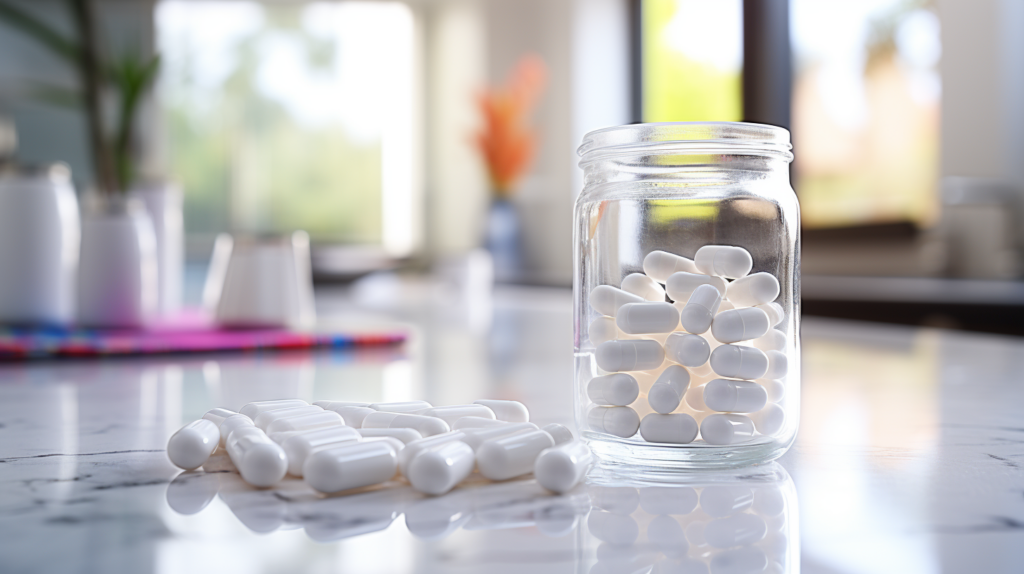If you’ve ever looked into purchasing probiotics, you might have been taken aback by their high cost. You’re not alone. Many people wonder why these supplements are so expensive.
Probiotics are living microorganisms that provide health benefits when consumed. They’re commonly found in fermented foods like yogurt, sauerkraut, and kimchi, but many people choose to supplement with probiotics for their potential health benefits.
So, why are probiotics so expensive? There are numerous factors that contribute to their high price point, and understanding these factors can help you make informed decisions about your supplement choices.
Key Takeaways:
- Probiotics are living microorganisms that provide health benefits when consumed
- Supplementing with probiotics can be expensive, but there are reasons for their high cost
- Understanding the factors that contribute to the price of probiotics can help you make informed supplement choices
Understanding the Importance of Probiotic Supplements
If you’re wondering whether probiotic supplements are worth the cost, the answer is a resounding yes. These supplements play a crucial role in promoting gut health, enhancing digestion, and supporting the immune system, among other benefits.
Probiotics are live microorganisms that can offer numerous advantages when consumed in adequate amounts. They help maintain a healthy balance of bacteria in the gut, which is vital for overall health and wellness. When the gut bacteria are in balance, the digestive system works efficiently, and the body can absorb nutrients better.
Several studies have also shown that probiotics can help alleviate digestive issues such as bloating, gas, constipation, and diarrhea. They can also reduce inflammation and protect against various infections.
In fact, a study published in the Journal of Clinical Gastroenterology found that probiotic supplements can be beneficial in treating Irritable Bowel Syndrome (IBS), a condition that affects millions of people in the United States.
While probiotics are found naturally in certain fermented foods like yogurt, kefir, sauerkraut, and kimchi, these foods may not contain enough probiotics to make a significant impact. That’s why probiotic supplements are becoming increasingly popular as a convenient and effective way to boost your gut health.
The key is to choose a high-quality probiotic supplement that contains strains that are most beneficial to your particular health needs. Consult with your healthcare provider to determine which probiotic supplement is right for you.

Factors Affecting Probiotic Prices
Probiotics have gained immense popularity in recent years due to their potential health benefits, but the high price of probiotic supplements has left many wondering if they are worth the investment. Several factors contribute to the costly nature of probiotics, including production methods, quality control, research and development expenses, marketing efforts, and regulatory compliance costs.
| Production Methods | Manufacturing probiotics requires specialized equipment and technologies that are expensive to acquire and maintain. The process of producing probiotic strains can also be time-consuming and labor-intensive, adding to the production costs. |
|---|---|
| Quality Control | Probiotic supplements must undergo rigorous testing to ensure that the strains are viable and effective. This testing process requires specialized equipment and trained personnel, increasing the cost of production. |
| Research and Development Expenses | The development of new strains and formulations of probiotics requires significant investment in research and development. This includes testing the effectiveness of strains in clinical trials, which can be costly. |
| Marketing Efforts | Companies invest heavily in advertising, labeling, and promotional campaigns to stand out in the crowded probiotic market. These efforts add to the cost of producing and distributing probiotic supplements. |
| Regulatory Compliance Costs | The manufacturing and selling of probiotic supplements are subject to strict regulatory requirements, including safety standards, labeling requirements, and quality control measures. Ensuring compliance with these regulations can be expensive. |
While these factors contribute to the high price of probiotic supplements, the potential health benefits and the value they provide make them a worthwhile investment. In the next sections, we will examine the importance of probiotics for maintaining gut health and overall well-being, as well as alternative options that can be more cost-effective for achieving similar health benefits.

Research and Development Costs
One of the major factors contributing to the high price of probiotic products is the significant investment required for research and development. Developing and testing new probiotic strains involves extensive research to ensure their safety and effectiveness. This involves a long and costly process of identifying and isolating promising strains, performing clinical trials to assess their benefits, and ensuring that they meet regulatory requirements.
According to a report by Grand View Research, the global probiotics market size is expected to reach USD 94.48 billion by 2028, driven in part by the increased demand for probiotic supplements. To meet this demand, companies must invest in research and development to identify new strains and improve existing ones. While these investments are necessary for the growth of the industry, they also contribute to the high price of probiotic supplements.
Did you know? The development of a single probiotic strain can take up to 10 years and cost millions of dollars.
| Cost Factors | Description |
|---|---|
| Research and Development | Testing the efficacy and safety of probiotic strains |
| Clinical Trials | Conducting human studies to evaluate the benefits and effects of specific strains |
| Regulatory Compliance | Meeting regulatory requirements for safety and efficacy |
With the increasing demand for probiotic products, companies must continue to invest in research and development to introduce new strains and improve existing ones. This is vital for ensuring the safety and effectiveness of these products. However, it also contributes to the high price of probiotics and is a key factor to consider when making purchasing decisions.

Quality Control and Manufacturing Processes
If you’ve ever wondered why probiotics are so expensive, the manufacturing process is one key factor. Quality control is essential to ensure that the final product contains the intended strains in the correct quantities and that it is safe for consumption. Additionally, the manufacturing process requires special equipment and facilities to maintain the viability and stability of the probiotic strains, which increases production costs.
Rigorous testing procedures are necessary to ensure that the probiotic strains remain potent throughout the manufacturing process and during storage. This includes testing for the presence of harmful contaminants and for the correct dosage of live bacteria. Any deviation from the intended specifications can result in a product that is ineffective or even harmful.
Manufacturers also need to adhere to strict standards for cleanliness and hygiene to prevent contamination, which can compromise the quality of the product. All of these requirements increase the cost of producing probiotic supplements.

Shelf Life and Stability
Ensuring the viability and stability of probiotic strains throughout their shelf life is a critical challenge for manufacturers. To maintain the potency of live bacteria, probiotics must be stored at specific temperatures and have a limited shelf life. This requires specialized packaging and storage, adding to the cost of production.
Probiotics are susceptible to moisture, heat, and oxygen, which can degrade their quality. To combat this, manufacturers use moisture-resistant packaging, oxygen-free environments, and refrigeration to preserve the bacteria’s potency. This careful handling and storage drive up the cost of production.
| Probiotic Supplement Packaging Options | Pros | Cons |
|---|---|---|
| Glass Bottles | Durable and protects against air and moisture | Can be heavy and difficult to transport |
| Blister Packs | Easy to transport and store, offers single-dose packaging | May not protect against moisture or oxygen infiltration |
| Foil Pouches | Lightweight and easy to store, can be economically produced | May be less durable and offer less protection against oxygen and moisture |
Overall, the costs associated with ensuring the stability and potency of probiotic supplements throughout their shelf life contribute to their high price in the market.

Marketing and Branding Expenses
Marketing and branding play a significant role in determining the final price of probiotic supplements. Companies invest heavily in advertising, labeling, and promotional campaigns to raise awareness and create brand recognition. Such expenses add to the overall cost of probiotics, making them more expensive for consumers.
The marketing and branding costs of probiotic supplements are influenced by various factors such as the target audience, the channel of distribution, and the competition in the market. For example, if the target audience is health-conscious individuals, companies may opt for more sophisticated packaging and labeling, which may incur additional expenses. Similarly, if the competition in the market is high, companies may need to invest more in advertising and promotions to stand out and maintain their market share.
The high marketing and branding expenses associated with probiotic supplements are a major contributor to their expensive price tag. While these costs are necessary for the growth and sustainability of companies in the probiotics industry, they add to the final price consumers pay for the products.

Regulation and Compliance Costs
Another factor contributing to the high cost of probiotics is the regulatory requirements and compliance costs related to producing and selling these supplements. In the United States, the Food and Drug Administration (FDA) regulates dietary supplements, including probiotics, ensuring their safety and proper labeling.
Manufacturers of probiotic products must adhere to strict regulations, including Good Manufacturing Practices (GMPs), which require rigorous testing and documentation to ensure consistency and quality. Compliance with these regulations increases the production costs of probiotic supplements. Furthermore, supplement manufacturers are responsible for proving the safety and effectiveness of their products, which can require time-consuming and costly research and development.

High Demand and Limited Supply
Another factor that drives up the cost of probiotics is their popularity and limited supply.
The demand for probiotic supplements has increased significantly over the years as more people are becoming aware of the role of gut health in overall well-being. This has led to increased competition among supplement manufacturers, driving up prices.
Additionally, certain strains of probiotics may be in limited supply due to their specific sources or production methods. This scarcity can also contribute to a higher price tag.
Despite the higher cost, many people choose to invest in high-quality probiotic supplements for their potential health benefits. However, it’s important to carefully consider the factors that affect probiotic prices and assess value for money when making purchasing decisions.

Health Benefits and Value for Money
Despite the high cost of probiotics, they provide invaluable health benefits that make them worth the investment. Probiotics support gut health, improve digestion, and strengthen the immune system, which can lead to a range of benefits such as reduced inflammation and lower risk of infections.
Research has also shown that probiotics may have a positive impact on mental health, including reducing symptoms of anxiety and depression. They may even help with weight management and reduce the risk of certain chronic diseases.
When considering the cost of probiotics, it’s important to remember the value they provide. While there are alternative options such as fermented foods and dietary changes, probiotic supplements offer a concentrated and reliable source of beneficial bacteria.
Keep in mind that not all probiotic supplements are created equal. Look for products with high-quality strains and advanced delivery systems to ensure optimal effectiveness. Don’t be swayed solely by price, as cheaper options may not provide the same level of benefits.

Alternative Options and Cost-Effectiveness
If you’re looking for more cost-effective ways to improve your gut health, there are alternative options to consider. Fermented foods, such as yogurt, kimchi, sauerkraut, and kefir, are rich in probiotics and can be a tasty addition to your diet. You can also try making your own fermented foods at home using starter cultures.
Another option is to incorporate more prebiotic-rich foods into your diet, such as garlic, onions, asparagus, and bananas. These foods contain fiber that feeds the beneficial bacteria in your gut and promotes their growth.
If you’re set on taking a probiotic supplement, consider purchasing a generic brand or searching for deals and sales at your local health food store. You can also buy in bulk to save money over time.
Remember, the most cost-effective option is to make dietary changes that support your gut health overall. By incorporating more fermented and prebiotic-rich foods into your diet, you can improve your gut health without breaking the bank.

Future Outlook and Affordability
Despite the high cost of probiotics, industry experts predict that the market will continue to grow in the coming years. With more research and development, there is potential for new, more affordable strains to hit the market.
A key factor that could drive down prices is the development of more efficient production methods. Some companies are exploring the use of recombinant DNA technology to engineer bacteria that can better survive the manufacturing process, reducing the need for costly quality control measures.
Another area of focus is the development of more stable probiotic strains that can survive longer shelf lives without the need for special packaging and storage. Advances in microencapsulation and probiotic delivery systems could also help to improve the efficacy of probiotic supplementation, reducing the need for high dosages and further lowering costs.
Overall, the affordability of probiotics will depend on the ability of manufacturers to innovate and reduce production costs while maintaining high standards of safety and efficacy. As the demand for probiotics continues to rise and consumers become increasingly aware of their health benefits, it is likely that we will see more options on the market at more accessible price points.

Conclusion
Despite the high cost of probiotic supplements, it’s important to consider their health benefits and value for money. Probiotics can contribute to improved digestion, reduced inflammation, and strengthened immune function, among other benefits. However, if you’re on a tight budget, there are alternative options, such as fermented foods and dietary changes, which can be more cost-effective for achieving similar health benefits.
It’s also worth mentioning that ongoing research and advancements in the probiotics industry may help reduce production costs and make probiotics more accessible in the future. Furthermore, it’s important to note that the cost of probiotics is influenced by factors such as research and development costs, quality control and manufacturing processes, regulatory requirements, marketing and branding expenses, and demand and supply in the market.
In summary, when deciding whether to purchase probiotics, it’s crucial to weigh the benefits against the price and consider alternative options if necessary. Regardless of your decision, the bottom line is that maintaining a healthy gut is essential for overall well-being, and incorporating probiotics into your diet can be an effective way to achieve this goal.
FAQ
Q: Why are probiotics so expensive?
A: Probiotics can be costly due to various factors, including research and development costs, quality control and manufacturing processes, shelf life and stability challenges, marketing and branding expenses, regulation and compliance costs, high demand and limited supply, and their health benefits and value for money.
Q: What is the importance of probiotic supplements?
A: Probiotic supplements play a crucial role in maintaining gut health and overall well-being. They support the immune system, promote digestion, and offer various health benefits.
Q: What factors affect probiotic prices?
A: The cost of probiotics can be influenced by factors such as production methods, quality control, research and development expenses, and marketing efforts.
Q: What are the research and development costs associated with probiotic supplements?
A: Developing probiotic strains, testing their effectiveness, and ensuring safety standards require significant investment, contributing to the high price of probiotic products.
Q: How do quality control and manufacturing processes affect probiotic supplement costs?
A: Strict quality control measures and rigorous testing procedures increase production costs, leading to expensive probiotic supplements.
Q: What challenges are associated with the shelf life and stability of probiotics?
A: Maintaining the viability and stability of probiotic strains throughout their shelf life can be challenging. Special packaging and storage requirements add to the overall cost of probiotic products.
Q: How do marketing and branding expenses impact the pricing of probiotic supplements?
A: Companies invest heavily in advertising, labeling, and promotional campaigns, which contribute to the overall cost of probiotics in the market.
Q: What are the regulation and compliance costs for probiotic supplements?
A: Meeting regulatory requirements and ensuring compliance with manufacturing and selling probiotic supplements incur additional expenses, which are reflected in their pricing.
Q: How does high demand and limited supply affect the cost of probiotics?
A: The popularity of probiotics has led to increased competition and limited availability of certain strains, driving up their price in the market.
Q: What are the health benefits and value for money of probiotic supplements?
A: Despite their higher cost, probiotic supplements offer important health benefits such as improved digestion, reduced inflammation, and strengthened immune function.
Q: Are there alternative options that are more cost-effective than probiotic supplements?
A: Yes, alternative options such as fermented foods and dietary changes can be more cost-effective for achieving similar health benefits. Incorporating these alternatives into a daily routine can be beneficial.
Q: What is the future outlook for probiotic supplement affordability?
A: Ongoing research and advancements in the probiotics industry may lead to increased affordability in the future. These developments could help reduce production costs and make probiotics more accessible.














